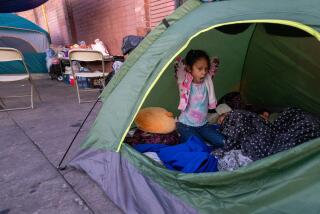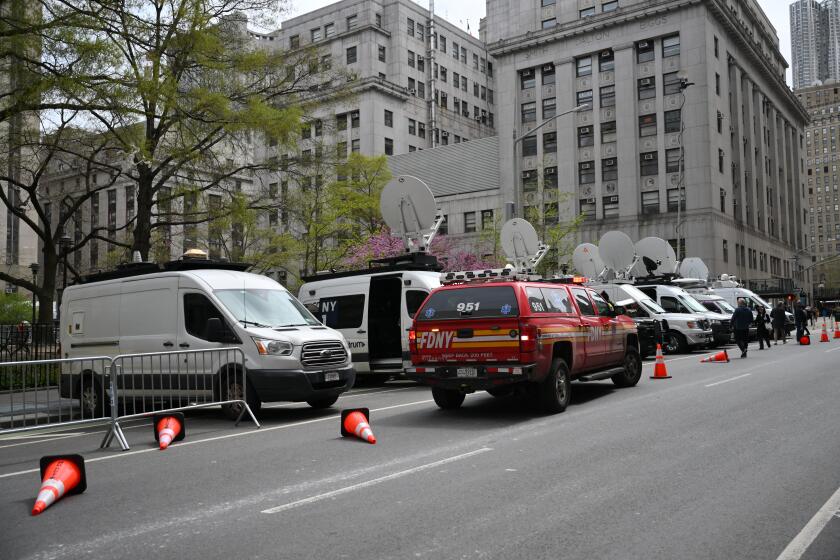A visit to a haven for kids in France’s ‘Jungle’ refugee camp one day before it’s set to be destroyed
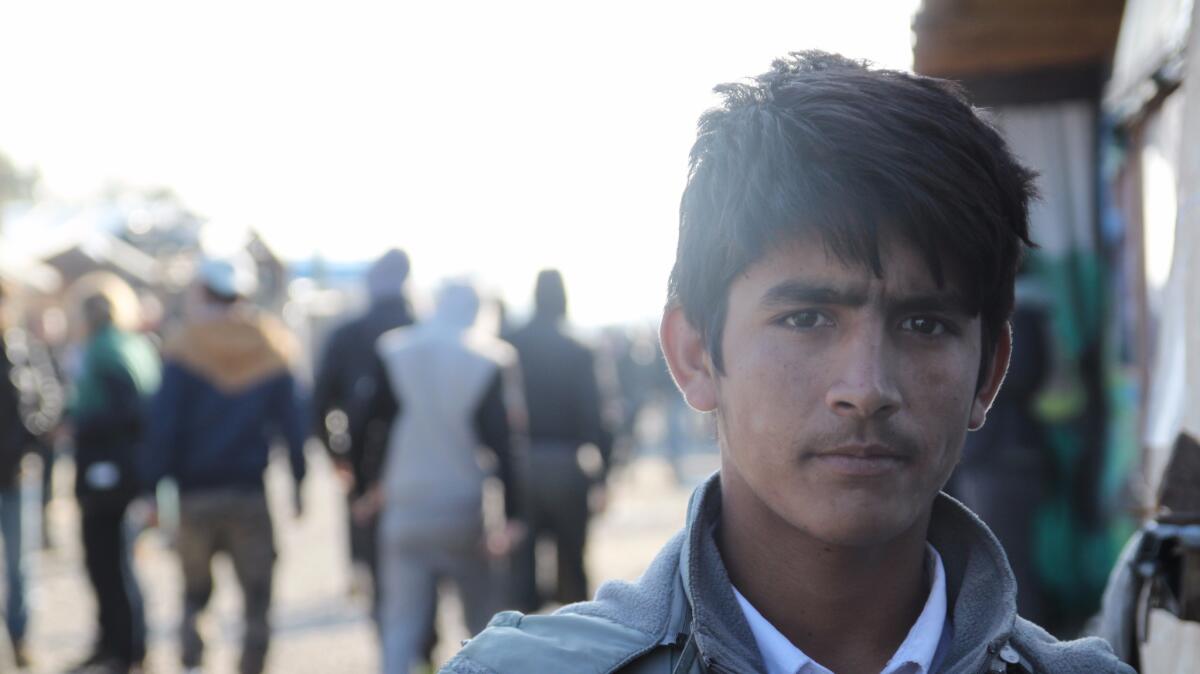
On the final day before authorities begin to dismantle the Calais refugee camp known as “the Jungle,” dozens of young people headed to a small sanctuary amid the chaos: a graffiti-fronted, one-room cafe — made of plywood and a tarpaulin roof — that has become a regular fixture in their otherwise disjointed lives.
Residents of the camp call it the Jungle Books Kids Cafe, and when the camp is torn apart, this place where refugee children found a small amount of normality and safety, as well as a vital community and support network, will be destroyed along with it.
Afghan music blasted out of speakers Sunday as teenagers sat in small huddles on the leather sofas, glued to their charging phones.
Others played a game of pool, passing the only cue they had between them.
Afsar Khadarkhail, 12, paced anxiously back and forth, in search of a cellphone charger — but, more important, hoping to find someone who could assure him he would soon be able to travel to Britain.
Afsar has been in the Jungle for a year now. He says his journey to Calais began in Afghanistan nearly two years ago, shortly after his father was taken away by the Taliban and feared killed.
His mother went to live with her brother, and the young boy embarked on a roughly 4,500-mile journey alone, traveling on foot and in any vehicle he could find through Iran, Turkey, Bulgaria and Serbia before reaching Hungary, where he spent three months.
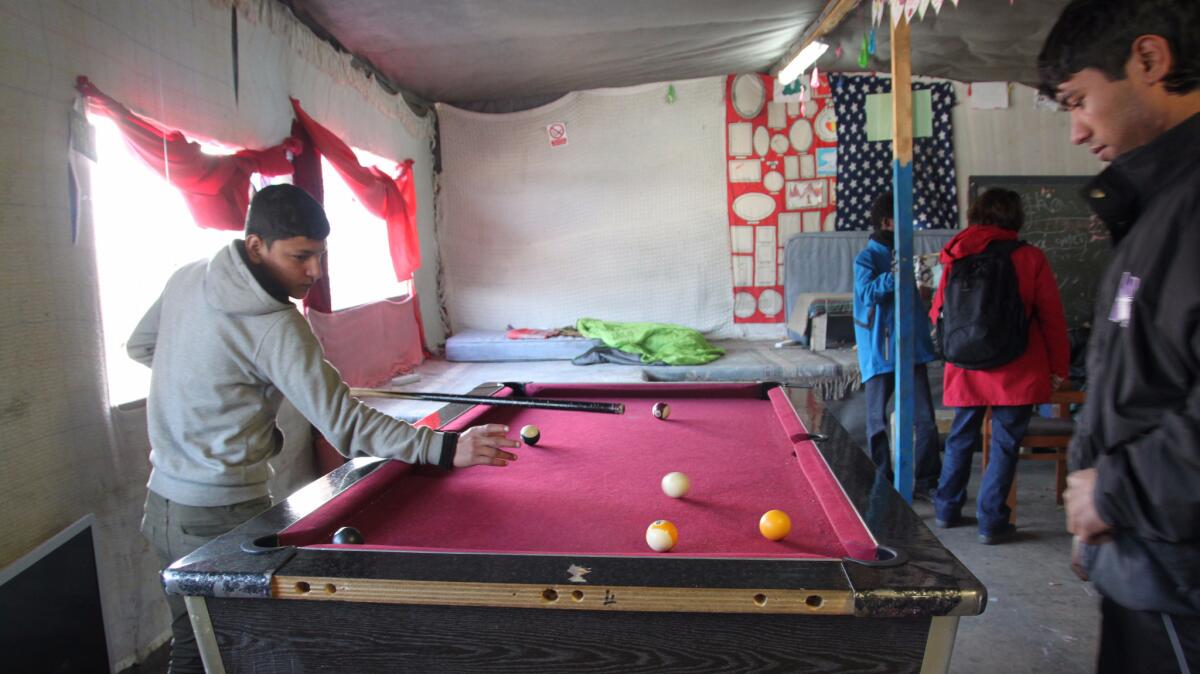
He then stowed away in a container for three or four nights before finally reaching France, where his sole intention has been to find a way to Britain.
“I want to go to the UK. I don’t want to [stay] in France,” he said. “In my home in Afghanistan, I said I was going to the UK. My uncle gave money for [me to come to the] UK.”
Afsar’s story is painfully common in the Calais camp in northern France, where he is one of an estimated 1,000 children who are living without a parent or caregiver. The site is home to about 10,000 people and has become a symbol of Europe’s failure to deal with the more than a million migrants who have crossed into the continent from war-torn countries in the Middle East and Africa.
“Tomorrow, I don’t know what I will do,” said Ihsanuallah Khan, a 14-year-old from Afghanistan who also spends time at the Jungle Books Kids Cafe, where a large poster of an iconic red London bus hangs on the wall.
“I want to go to England, because I want to study and make my life there.”
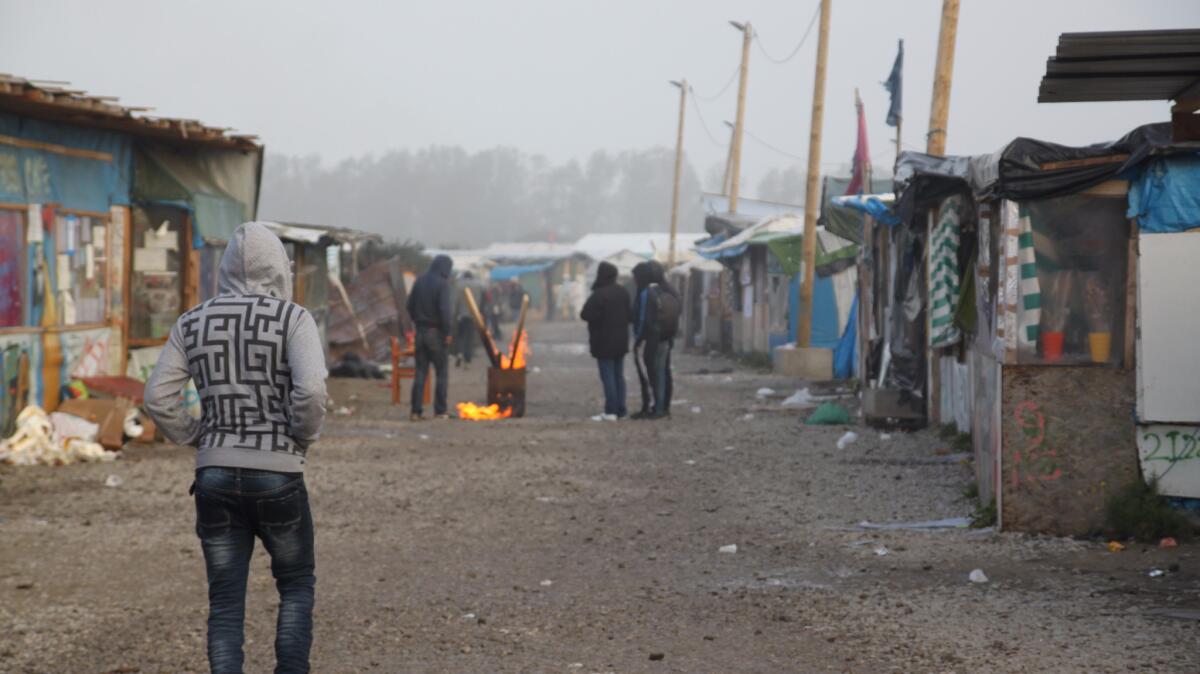
Britain appeals to the boys for a number of reasons. They speak and understand English, and they have heard the country will welcome them in a way that France has not.
French authorities have repeatedly clashed with the inhabitants and say they will begin relocating them starting at 8 a.m. Monday and plan to demolish it entirely.
The news has left Afsar and hundreds of unaccompanied minors like him feeling anxious and uncertain about what their future now holds.
“Listen, you are OK,” Mary Jones, a British former teacher who co-founded the cafe, tried to assure him. “I’m sure you will be OK. We will get you on a list.”
When the Jungle was partly torn down in March, 129 children disappeared off authorities’ radars, said aid groups, which fear some of them may have fallen prey to traffickers.
In an attempt to prevent that from happening again, British and French authorities have stepped up their efforts to register all the minors living there before police move in.
As of Sunday morning, 251 people from the camp had been transferred to Britain, according to Safe Passage, an aid group working closely with the British government.
Some of these include young people with close relatives already living in Britain who are willing to take them in, and others who have no relatives there but were deemed to be vulnerable.
Jones also helped to set up the nearby Jungle Books library, a repository of donated books for people living in the camp, and has spent the last year and a half volunteering in the camp. She rarely asks the young people where they have come from or what they have experienced.
She simply wants to provide a place they can play, contact relatives, watch television, eat warm food and ultimately remember they are still children.
“The Jungle is a horror,” she said. “It shouldn’t exist, it’s full of dangers and it’s really not a nice place, but what it has got is this enormous human spirit and this wonderful feeling of community where everyone looks after each other.… What’s being lost is this supportive community.”
Those minors who are not processed by Monday morning will be moved into large white containers on the site of the camp, where authorities say their cases can be dealt with.
Some will end up in Britain; others could be processed in France. For Afsar and Ihsanuallah, it is hard to know whether this is an adequate solution.
Their hearts are set on making it to Britain, and both boys readily admit trying to sneak onto a train or truck heading through the tunnel that goes under the English Channel.
They know several who have made it, but also others who lost their lives in the process.
“I will take the risk; I know I will maybe be dead,” Afsar said. “I think about going to the UK because I want to make my life there, I want to go there to study something.”
On the eve of the demolition, confusion and tension in the camp were rampant, and aid groups warned that clearing the Jungle was simply putting a Band-Aid on a much bigger problem.
“When the demolition is over, the problem is not over,” said Red Godfrey-Sagoo, director of operations for Safe Passage UK.
“We acknowledge the fact that both [French and British] governments are now trying to address all of this. But it’s incredibly worrying too that it’s basically come down to the wire with the demolition that these issues are being addressed. And it does not address the population that is on its way through Greece and to France.”
Boyle is a special correspondent.
More to Read
Start your day right
Sign up for Essential California for news, features and recommendations from the L.A. Times and beyond in your inbox six days a week.
You may occasionally receive promotional content from the Los Angeles Times.


